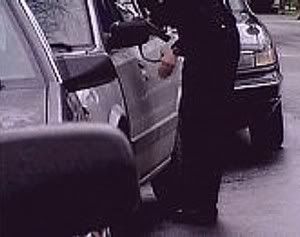What is Racial Profiling?

What is racial profiling? According to the group Ethnic Majority, this question is answered not with definition but with example. The example cited is a scenerio referred to as "dwb", or driving while black. Here the allegation is that they (police officers) target African-Americans for traffic stops. The reason? The police assume that African-Americans are more likely to be involved in criminal activity.
The "dwb" scenerio is obviously not best practice material. How does such a thing happen? One theroy is that officers pick up this practice as a result of "informal" on-the-job training. Racial Profiling is not "formally" taught at the Police Academies, rather the idea that blacks are more criminal is practiced and taught in a more covert or informal manner. Now assuming that this is possible, or is actually occuring, is easy. Proving or disproving the "dwb" practice becomes another matter altogether. Statistics have become critical in this role.
Again, it must be stressed that VeryTerry is not a Social Scientist. Nor is VeryTerry a skilled statistitian. Okay? I'm just a guy who sometimes gets curious about stuff. Looking into this, I very quickly got the idea that most police departments do have informational gathering procedures in place relative to race and sex and police contact. To get an idea about these policies you can explore the website of the Police Executive Research Forum.
If you start to read the literature on what the police themselves refer to as Racially Biased Policing, it quickly becomes clear the issue is complex. Simply qualifying how statistics are gathered becomes complex.
So, I'm not here to focus on all that. I just wanted the reader to be aware that I'm taking a hotly debated and complicated issue and I am simplifying it drastically.
I will list some statistics I got from the U.S. Department of Justice. Their statistics reveal that in 1999:
21% of U.S. residents had a contact with the police.
52% of these contacts involved traffic stops.
Under 1% of these stops involved police having to use force.
10% of White drivers were stopped.
12% of Black drivers were stopped.
9% of Hispanic drivers were stopped.
Interestingly, 84% of all drivers stopped considered the stop legitimate.
It seems rather fair to me. However this next set of U.S. DOJ stats gives me pause for thought:
Of the 19.3 million drivers stoppen in 1999, some 6.6% were subject to some kind of physical search.
During the traffic stop, police were more likely to conduct a search on a male (9.4%) rather than a female (2.3%), and more likely on a black (11.3%) or Hispanic (11.0%)than a white (5.4%).
According to these DOJ stats, it seems the "dwb" phenomina may have some credibility to it. The good news is that police departments are aware of the problem and are taking steps to avoid this prejudical procedure.

The get real fact however is that we all know a good police officer is going to use instict. The old "if it walks like a duck and it quacks like a duck" line of reasoning. When VeryTerry is channel surfing on the ol' television and he sees the gansta rappas doing their "gansta" thing in their "gansta" videos, it hardly seems surprising that police officers might have a tendency to look long and hard at folk who are emulating this lifestyle out on th' street. It probably doesn't matter to the police if you're black, white, or Hispanic.
Now I wouldn't want any officer pulling me or anyone else over simply because we happened to be in the "wrong" neighborhood, or because we're out at the "wrong" hour of the night. Officers must utilize sound probable cause. Nor would I want officers out "manufactoring" reasons for a traffic stop. Officers must be held accountable for the stops they make. However, if the officer has legitimate probable cause, he should make the stop, irregardless of the subject's race or sex. If stopped, it is up to citizens to be informed about their rights. What are your rights? Check out FlexYourRights.org.
To conclude, I think none of us wants to see anyone stopped without legitimate probable cause. We Americans are, I believe, largely in agreement that equal rights are desirable. Each one of us should expect to be treated fairly under the law. No American citizen should be subject to police abuse of power. America is an open country where citizens and interest groups can keep an eye on authority to insure freedom from abuse.

In this post, What is Racial Profiling? I want to get at the traditional idea about Racial Profiling. That is, What is Racial Profiling in the pre 911 America. This post will become a base for my next.
In my next post I will be exploring the idea of racially profiling terrorism suspects. Is profiling terrorism suspects simply another case of "dwb", or is it more important and more justifiable? Let me know what you think.
